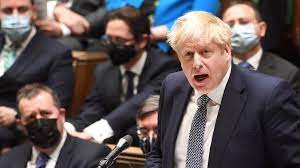On Wednesday, British Prime Minister Boris Johnson was desperately clinging to his position despite a growing number of legislators asking for his resignation and the resignation of ministers who said he was unfit to lead.
Johnson’s secretaries of finance and health, as well as a number of others in lower-level positions, resigned on Tuesday, citing the latest in a string of scandals that have marred his administration.
Johnson faced increasing pressure to resign, but he demonstrated his will to hold onto power by naming businessman and minister of education Nadhim Zahawi as his new finance minister and filling some of the other positions.
When asked if he would lower taxes, such as the company tax, Zahawi responded that he would examine all possibilities in order to revive and expand the faltering economy and control the rising inflation.
Later on, Wednesday, when Johnson appears in parliament for his weekly question period and a two-hour grilling from the chairs of select committees, the depth of antagonism Johnson faces inside his party will be made clear.
One Conservative legislator told reporters, speaking anonymously, “I fear we will have to drag him kicking and screaming from Downing Street.” But we will if that is the only option.
Johnson, a former journalist and mayor of London who became the face of the United Kingdom’s exit from the European Union, won a resounding election victory in 2019 before assuming office with a confrontational and frequently disorganized style.
The prime minister was fined by police for violating COVID-19 lockdown restrictions, and a damning report was released regarding the conduct of staff members at his Downing Street office who broke their own lockdown guidelines. His leadership has been plagued by scandals and gaffes over the past several months.
Additionally, there have been policy reversals, unsuccessful defense of a politician who violated lobbying laws, and accusations that he has not done enough to address the cost of living crisis, which is causing many Britons to struggle to keep up with rising fuel and food prices.
Johnson’s “serial dishonesty,” according to The Times of London, is “utterly destructive” to efficient government.
It read, “Every day that he stays just intensifies the sense of anarchy. “He ought to leave for the benefit of the nation.”
The most recent drama at the center of British power comes while the economy is fast declining and some experts are expressing concern that the nation may enter a recession.
CONFIDENCE LOST
In the most recent incident, Johnson was forced to issue an apology for having appointed a lawmaker to a position that dealt with party welfare and discipline despite being informed that the politician had received allegations of sexual misconduct.
What the prime minister knew about the previous actions of that MP, who was forced to quit, and when he learned it has both been subject to multiple revisions in Downing Street’s account.
As a result, eight other people departed their junior ministerial or ambassador positions, including Sajid Javid, the health secretary, and Rishi Sunak, the Chancellor of the Exchequer, the finance minister.
Javid wrote in his letter of resignation, “It is evident to me that this scenario will not change under your leadership – and you have consequently lost my confidence too.
Johnson’s poor judgment, low moral standards, and inability, to tell the truth, were also noted by a number of the clergy.
Despite the support of the rest of Johnson’s top ministerial team, for the time being, a recent YouGov survey revealed that 69 percent of Britons said Johnson should resign as prime minister.
Scottish Secretary Alister Jack stated, “I totally back the prime minister.” Although I am sorry to see my wonderful friends leave, we still have a lot of work to do.
Due to party rules, Johnson cannot face another challenge of this nature for a year after surviving a vote of confidence by Conservative legislators a month ago.
However, some parliamentarians are attempting to alter these regulations, and a parliamentary committee is looking into whether he lied to the legislature on COVID-19 lockdown violations.
The executive of the so-called 1922 Committee, which establishes the guidelines for leadership confidence votes, is expected to be open for nominations on Wednesday. Johnson’s detractors want to amend the laws so that another such vote can be held before the 12-month grace period is allowed. To do this, they need to elect enough people.
If Johnson were to go, it might take a few months to find a replacement.
After years of heated wrangling, the exuberant Johnson secured a sizable parliamentary majority only two and a half years ago on a vow to resolve Britain’s divorce from the European Union.
But since then, the government has lurched from one crisis to another as a result of its first handling of the outbreak, which received harsh criticism.
Although Johnson received more praise for his support of Ukraine, the increase in his popularity in the polls did not endure. His approval ratings are at record lows, and his Conservatives are in last place behind the opposition Labour Party.
Johnson’s confrontational attitude toward the European Union has also hurt the pound, aggravating inflation, which is expected to top 11%.
Labour leader Keir Starmer declared, “It’s apparent that this government is now falling after all the sleaze, the scandals, and the failure.”




















